Some YA and fantasy reviews by your friendly neighbourhood library assistant! °˖✧◝( ⁰▿⁰)◜✧˖° 📚 Find your library service! 📚 📚 Support bookshops! 📚
Don't wanna be here? Send us removal request.
Text
Five Feet Apart by Rachael Lippincott
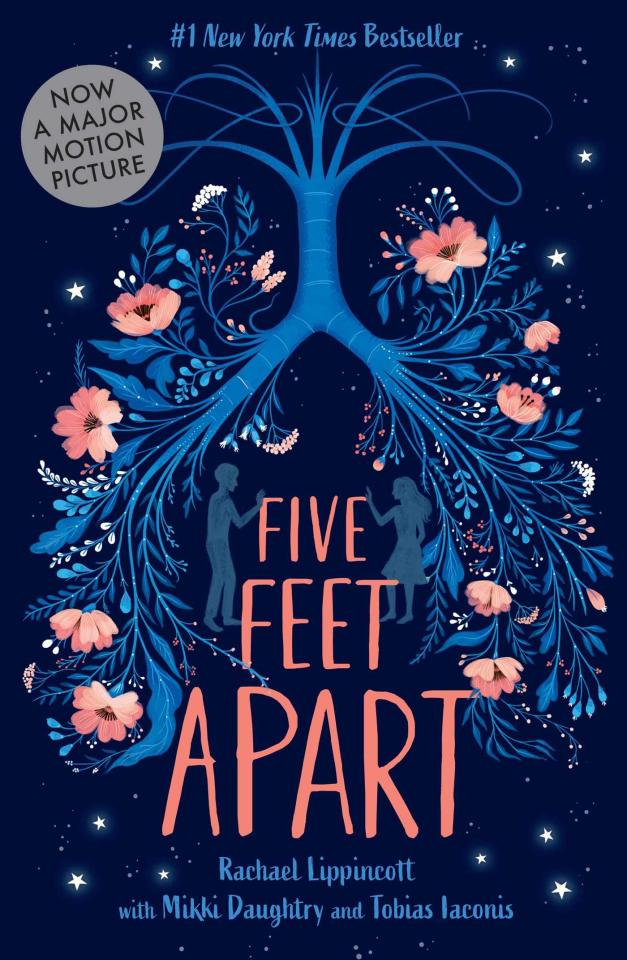
Rating: ★ ★ ★ ★ ★
Five Feet Apart tells the story of Stella and Will, who both have cystic fibrosis - an inherited disease that affects the lungs and digestive system. They’re both staying in hospital to receive treatments - Will against his wishes, and Stella with a fierce determination to survive - when they begin to fall for each other. But Will has an infection that could be fatal to Stella, which means no matter what, they must not be within six feet of each other.
From the back cover:
“What if they could steal back just a little bit of the space their broken lungs have stolen from them? Would five feet apart really be so dangerous if it stops their hearts from breaking too?”
When I first began the book I wasn’t sure if I was going to get into it. By the last few chapters, I was sobbing. I was thoroughly invested in Will and Stella’s relationships - with themselves, with their disease, their family and friends, and everything else besides. Every main character wormed their way into my heart and they still haven’t left - especially Stella’s best friend, Poe, who also has CF.
My heart was both buoyed and wrung out over and over by the highs and lows of Will and Stella’s story. There’s despair, denial, anguish, but also heaps of joy, friendship, and triumph. This passage made me want to stand up and yell:
“‘As CFers, so much is taken away from us. We live every single say according to treatments, pills. [...] So, after all that CF has stolen from me - from us - I’m stealing something back.’
She holds up the pool cue defiantly, fighting for every one of us. ‘I’m stealing three hundred and four point eight millimeters. Twelve whole inches. One f***ing foot of space, distance, length. [...] Cystic fibrosis will steal no more from me. From now on, I am the thief.’”
Oh, and romance. The kind of romance that’s yearning and soul-singing and beautiful. I love this stuff.
“We look at each other in the reflection of the glass, and I feel the gravity of him, pulling at me across the open space. It tugs at every single part of me, my chest and my arms and my fingertips. I want to kiss him more than I want absolutely anything.
Instead, I lean over, kissing his reflection on the glass.
He reaches up slowly, touching his mouth with his fingertips, like he felt it, and we turn to face each other.”
The only thing that I want to complain about is pretty insignificant, but it nagged at my suspension of disbelief: the amount of freedom these teens have in the hospital. They seem come and go from their rooms pretty much as they please, (even Stella who is apparently supposed to stay well away from any potential source of dangeous bacteria) and they rarely encounter anyone who questions whether they should be wondering around at night with a pool cue. At one point Stella hides in the NICU and pretends to be napping - and there’s not a single person around; the staff member who comes to find her lets her sleep there, on a sofa, far from her ward. I’m not an expert by any means, but it didn’t feel realistic.
It wasn’t enough to detract from my overall enjoyment, though. As far as books in the terminally-ill-teenager-falls-in-love genre go, I liked this better than Everything, Everything (Nicola Yoon), and much, much better than The Fault in our Stars (John Green). It hasn’t quite topped Before I Die, though (Jenny Downham’s writing style completely and utterly immersed me, but that’s a review for another day).
I recommend this if you’re into teen romance, and even if you’re not really into teen romance; there’s a lot of focus on family and friendships, and cystic fibrosis. It’s an interesting look into what life might be like for some people with this disease, and happens to be a really entertaining read too.
Content warnings: death
Age-appropriate?: profanity
0 notes
Text
Run, Rebel by Manjeet Mann

Rating: ★★★★★
Run, Rebel by Manjeet Mann is a YA novel written in verse. It's a story of hope and resilience, of women working together to overcome abuse, of chasing your dreams despite being told you can't. It’s a story of a rebellion.
Amber Rai is a teenager who loves to run, and she's good at it, good enough to make it to regional competitions. However, her father tells her she's not allowed - that it's not right for a girl, that it’s not respectable, that "people will talk". She's also not allowed to go anywhere after school, or spend time with boys, so her crush on her friend David is doomed right from the beginning. At home, things are even worse. Amber's mum is abused by her dad, and she refuses to leave or try to do anything about it. All Amber's hurt and frustration has nowhere to go, and she ends up bullying a girl at school. I’ve not read much from the perspective of someone bullying others before, and I found it interesting.
“Inflicting pain on others halves your own hurt and doubles your self-worth.”
The plot holds the reader in suspense as it gathers steam, and the author's verse is well written; she plays with format, structure and words in inventive ways, and the first-person present-tense has an immediacy that immerses you straight into Amber's pain and anxiety, as well as the freedom she feels when running.
“Running makes the lines s t r a i g h t e r. Turns down the rage in my stomach.
Loosens the phantom grip on my throat.
Provides respite from the familiar urge to escape.”
I love the way none of the characters are neither completely perfect nor completely flawed. And it was heart-wrenching the way Amber felt torn by her love for her father while also hating and being afraid of him, and the ways she feels she’s the same as him.
“I stand tall. I stand strong. My stare unflinching, my body strong.
And suddenly Dad doesn’t seem that big any more.
[…]
Looks like I do have my dad’s height after all.”
Run, Rebel will appeal to readers who like Elizabeth Acevedo and Sarah Crossan.
Content Warnings: Domestic abuse, panic attacks
Age appropriate?: Some descriptions of violence, occasional strong language
0 notes
Text
Toffee by Sarah Crossan

Rating: ★ ★ ★ ★ ★
Toffee is a moving novel written in powerful verse. Allison, a teenager running away from her abusive father, ends up with a crabby elderly lady with dementia, Marla, who mistakes her for her old friend Toffee. Allison corrects her at first but soon slips into the role of Toffee, caring for Marla in the absence of family or friends – Marla’s son is abusive and uncaring, and her carer often does not turn up.
“I wasted a lot of time waiting for my father to be a better person, wondering if he could change, if I could change him by being quiet, disrupting his life as little as possible.”
The novel jumps between present day and the events leading up to Allison running away from home. It’s a novel about two victims of abuse who slipped through the cracks – a teenager trapped caring for her father, an elderly person with dementia – and their loneliness being eased a little by their unlikely companion.
Things are definitely not all plain sailing, though, with some heartbreaking and difficult moments, some of which made me cry even on the second read. Their friendship is lovely, though, especially when ‘Toffee’ makes Marla feel young and playful again. In turn, Marla helps Allison overcome her damaged self-esteem as a result of her abuse.
“None of it was ever about you. It was about him. It's always about them. Surely you know that?”
Sarah Crossan’s verse as always flows nicely and is full of detail and heartfelt emotion; it feels natural and unstilted. I like that there’s still hope in the end – Sarah Crossan has broken my heart with one or two previous novels’ endings, so I can’t complain.
“No goodbye is forever unless you can erase everything you ever knew about a person and everything you once felt.”
This is the first YA I’ve read which focuses on the older generation as much as the younger in this way, and I strongly recommend this unique and touching book. If you like this, check out Sarah Crossan’s other novels, especially One and We Come Apart!
Content warnings: physical and emotional abuse
Age appropriate?: drinking, strong language
0 notes
Text
A Treason of Thorns by Laura Weymouth
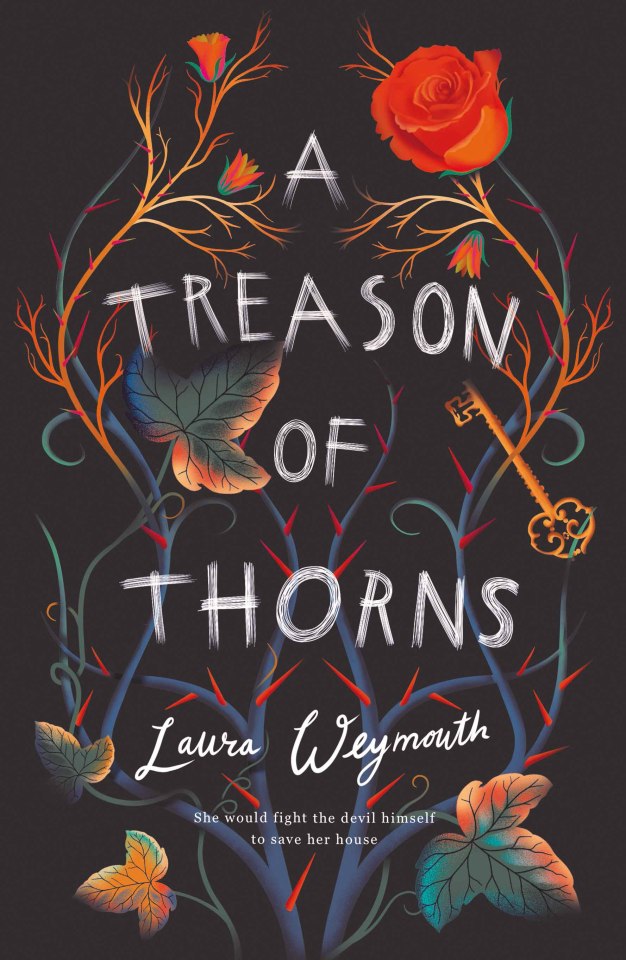
Rating: ★ ★ ★ ★ ☆
I love love love the concept of this novel, and honestly I kind of wish it was a whole series (though I feel like standalones are pretty rare in the YA fantasy genre and actually found it quite refreshing to know that the end of the book would actually be, you know, the end).
A Treason of Thorns is set in an England in which Great Houses are powerful and semi-sentient, and have been around for centuries. Every Great House has a Caretaker who helps channel its power so it doesn't ravage the land with its mortar, and this duty gets passed down through bloodlines. Mortar is like a sort of house blood; if you channel House magic without holding the House’s key, or owning the House’s deed, the mortar gets into your blood and eventually begins to kill you.
I feel like this is originality on a Harry Potter level, and is seriously underappreciated.
Violet is in exile for seven years after her father, the Caretaker of Burleigh House, is executed for treason. When she finally goes home, the house is in ruins and poisoning the countryside, and her childhood friend Wyn is... different. It’s her duty to somehow put everything right, before the king burns her house down for good - but it might cost her everything.
It took me a while to get into, I’ll admit. At first I was a bit like, oh look, another Katniss Everdeen, but Violet soon grew on me, and by the end of the book I loved her. I was expecting there to be a point where she’d become either entirely “nothing else matters to me except my true love, f*** you Burleigh” or entirely “I know my duty and will see it through if it tears me to pieces, sorry Wyn”, but she actually never quite gave up on her dedication to both, and I loved that.
“I'm not just Violet Sterling, Caretaker of a failing House. I am the sum of everywhere and everything I've been. And I am still, in my deepest parts, Vi of the Fens, who never goes home empty-handed.”
The strongest point of the book, after its originality, is its imagery. I felt wholly transported to every scene, and the atmosphere was almost palpable. It’s one of those books you’d love to see as a film even just for the aesthetics, because this beautiful, centuries-old house becoming wild and ruinous was brought to life in such a tragic yet beautiful way.
The ending left me confused, though. Don’t get me wrong, it was beautiful - I just didn’t quite understand. Disclaimer: this may just be me being completely thick.
Lastly, shoutout to Laura Weymouth for including content warnings in her novels’ descriptions online! I would love for this to happen more often in official media. There’s nothing worse than, especially as a young teenager, getting 4/5ths through a novel and then coming across something disturbing. Please feel free to call me a snowflake for advocating content warnings.
If you like A Treason of Thorns you’ll like Winternight Trilogy by Katherine Arden!
Content warnings: mild body-horror, anxiety, non-graphic physical & emotional abuse
Age-appropriate?: see content warnings; otherwise clean
0 notes
Text
Rosie Loves Jack by Mel Darbon

Rating: ★★★★☆
“Jack makes me sky-tall and lion brave… and I make Jack’s angry fly away.”
Rosie Loves Jack is a story about determination, love, and the perception of people with SEND, and features one of the best heroines I've read this year.
Rosie is a 16 year old college student who goes on a cross-country mission to be reunited with her boyfriend, Jack, who's been sent away because of his anger issues.
Rosie has Down's Syndrome, and her first-person perspective is in some ways refreshingly different from many other romance-driven YA novels, and in some ways comfortingly familiar. I like that Rosie encounters so many different types of people on her journey, and each one is written with realism that made it feel as though they'd climbed into my brain. Mel Darbon’s writing overall is fantastic and feels very authentic for Rosie; it’s clear she’s spent a lot of time with people with Down’s Syndrome.
I also loved Jack's postcards interspersed throughout complete with drawings he'd done, that was a nice touch.
The plot was unpredictable enough to keep me gripped, and several times I wished I could forego everything else just to keep reading. I will admit that when you zoom out and look at the whole series of events, it feels a little unrealistic, but on the whole the story is beyond reproach.
In fact my main gripe is with the quote on the cover. "A pure joy from start to finish." I disagree. There's no joy to be found in trafficking (this was a dark and unexpected twist that I’m spoiling for the sake of content warnings). There's no joy in suicide. Nor is there joy when people bully, laugh at, and take advantage of Rosie.
But there is, I suppose, a fierce kind of joy in the way Rosie survives, pushes through the pain, and perseveres (for love!) despite all these things; I’ll accede that much.
“‘That’s completely different!’ Dad jumps up and goes over to the window. ‘Why, Dad? Is it cos I have Down’s Syndrome? Down’s syndrome isn’t me. I am Rose.'”
Content warnings: non-graphic abuse, implied rape, non-graphic suicide, panic attacks, drug abuse, brief emetophobia warning
Age-appropriate?: strong language, non-explicit underage sex-trafficking
0 notes
Text
Loveless by Alice Oseman
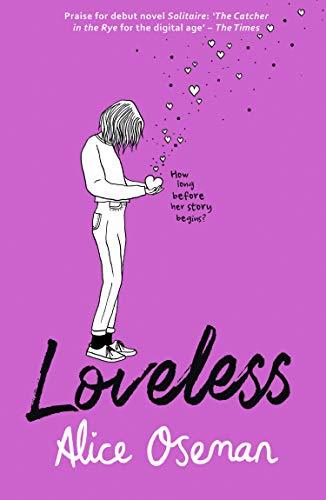
Rating: ★★★★★
Ahhh Loveless... this review has been a long time coming.
See, I decided when I started that I want to write balanced reviews, but unfortunately I just don’t think that’s possible here because I can’t find a single thing to criticise.
Georgia adores romance, but she’s never experienced it. She’s never had a crush, fallen in love, or been attracted to anybody. As she starts university, she decides that she is going to have a romance. Maybe she’ll even find true love.
What she finds instead is that things aren’t always so straightforward. She learns about the existence of asexuals (aka aces), who don’t feel sexual attraction, and aromantics (aka aros), who don’t feel romantic attraction. She learns that either, or both, are totally normal things to be, if rarer than some other identities.
But isn’t it lonely, Georgia and I both wonder? Georgia’s friend and ‘college parent’ Sunil, the president of the university’s Pride Society, tells her about his friend Jess, an aromantic bisexual:
“‘She’s happy,’ said Sunil, like he’d read my mind. ‘It took her some time to feel happy with herself, but… I mean, you met her. She’s happy with who she is. Maybe it’s not the heteronormative dream she grew up wishing for, but… knowing who you are and loving yourself is so much better than that, I think.’”
Of course, Georgia is unsure at first, maybe even afraid. She’s spent so long longing for love. Through the course of the novel, though, what Georgia discovers is that there are more kinds of love in the world than romantic love. Love for your closest friends. Love for your family, blood-related or otherwise. Love for yourself. Love for your passions. Love for your corner of the world, your group/team/society/whatever you belong to. Loveless is full to the brim with love in so many ways and I adore it.
Georgia’s cousin has some sound advice:
“‘Give your friendships the magic you would give a romance. Because they’re just as important. Actually, for us, they’re way more important.’”
And Georgia does; damaged friendships are repaired, feelings are talked about, and it’s beautiful and wholesome and just as fulfilling as any romance would have been. I’m probably making the novel sound sappier than it is - Loveless is filled with drama and tension and mystery too, of course. I was on tenterhooks wondering what would become of Pip and Rooney’s relationship. Would Rooney’s dream become reality? Would Jason ever forgive Georgia? Was Roderick going to die?
Loveless is an engrossing, well-written story, it’s a learning experience, but perhaps most importantly, it’s a wellspring of LGBTQIA+ representation, pride, and love, and I want to give it to everyone I know.
Please read it!
Content warnings: aphobia/homophobia, strong language
Age-appropriate?: sexual themes, drinking
0 notes
Text
The Pieces of Ourselves by Maggie Harcourt
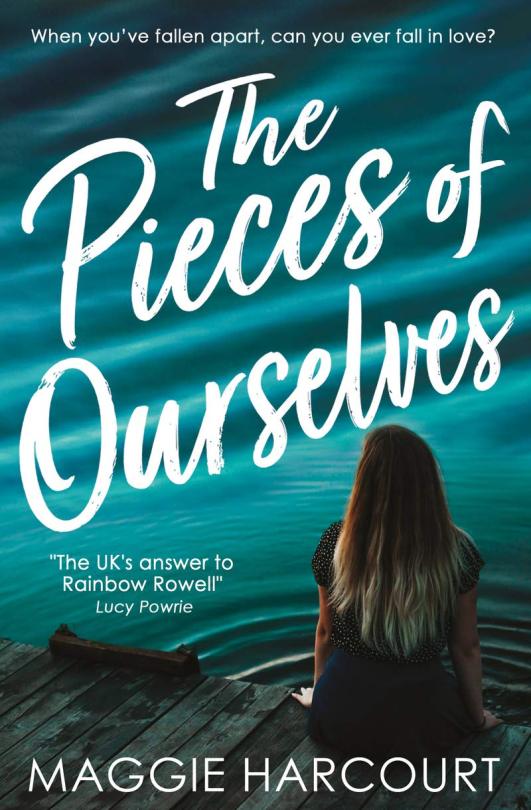
Rating: ★★★★☆
Flora has Bipolar disorder, and her life hasn’t been the same since an incident during her GCSEs meant she had to leave school early.
She’s part of the housekeeping team at a hotel in the countryside, living with her older brother, a gardener living on the hotel grounds. To everyone but her friend Mira she's pretty much invisible, and that's the way she likes it.
Hal has come to the hotel to research a WWI soldier who once lived in the building. He’s the reluctant heir to his father’s hotel franchise and he’s been granted some time to look into this soldier's history for his grandfather. Flora, with a little experience in history research, is assigned to help him. And what the two begin to uncover, as they grow closer huddled around mountains of old paper in the hotel attic, turns out to be a story of forbidden love between the soldier - the family’s heir - and a housemaid.
Coincidence, huh? But this is only the beginning of the spooky coincidences. In fact, the spooky coincidences sort of teeter on the supernatural in a way that made it a bit difficult to suspend my disbelief, but it’s easy to overlook since it's so damn heartwarming, especially after the soldier's tragic story.
Bipolar II isn't something I’m an expert on but it certainly seems to be written realistically.
I thought too quickly, spoke too quickly, jumped from idea to idea way too quickly. My brain had got stuck in high gear and nobody could keep up with it - not even me. [...] After the high came the low, and the weeks when even breathing hurt; where every thought felt like it was wrapped in mud and all I wanted to do was sleep and sleep and sleep. To lie face down on the floor and never get up again. Ever.
Mental health is a main theme and it’s handled well. I love that instead of her Bipolar ‘going away’, Flora finds a sense of control and ownership of it that allows her to live with it and move forward. The important people around Flora are all supportive and Hal reacts positively, and in the end, it looks as though Flora might soon have the courage to leave the safety of the hotel and continue her education. Overall, although some parts felt a bit cliché, I was pleased.
If you like The Pieces of Ourselves you might like Are We All Lemmings and Snowflakes, a YA which features a main character learning to live with Bipolar II but in a slightly different way to Flora.
Content warnings: panic attacks, bipolar disorder
Age-appropriate?: no warnings, though it is classed as YA
0 notes
Text
The Declaration by Gemma Malley

Rating: ★★★★★
In the future, everyone takes Longevity, the drug that prevents ageing, resulting in almost everyone being able to essentially live forever. But if you take the drug, it's forbidden to have children - the planet only has so many resources, after all. If you break the rules and have an illegal child, a ‘Surplus’, you go to prison, and the Surplus is taken away. But what happens to it then? In some countries Surpluses are put down, but not here.
Surpluses have their uses, after all.
As soon as I read the blurb for this book I was hooked, and I was hooked all the way through the trilogy.
My name is Anna and I shouldn’t be here. I shouldn’t exist. But I do.
Anna hides her secret diary away each night because she doesn’t want to get into trouble for breaking the rules. Life in Grange Hall is governed by rules, rules that have to be obeyed in order to make up for breaking the biggest rule of all. Being born.
But when Peter arrives and starts to tell Anna shocking things about the outside world, she learns to question the rules and, with Peter, struggles to escape the past and find a better future.
Rereading it after a number of years though, things feel a bit more predictable, and the twists not quite so shocking. It's immediately obvious that Mrs Pincent, for example, with her undying, passionate hatred for the children of the Surplus Hall, is holding a grudge about something. And you know Anna is going to fall for the handsome, mysterious new boy with his secrets and his daring.
The writing style is not bad, but it is fairly simplistic and nothing particularly impressive. It suffers from that YA trope of giving everything capital letters to afford it Grave Import, which can be useful in moderation but is pretty awkward when overdone.
I’m very lucky to be here, actually. I’ve got a chance to redeem my Parents’ Sins, if I work hard enough and become employable. … In England they help Surpluses be Useful to Legal people, so it isn’t quite so bad we were born.
Embedded Time had been one of the New Ideas for Surpluses, when Surplus Halls were still new. … Embedded Time sat under the skin, on the wrist, and every movement the Surplus made kept the mechanism going so that it wasn’t Wasteful or resource-intensive.
I do think the characters are interesting; some people are not quite what you assume. The perspective of secondary characters like Mrs Sharpe gives them depth while also being a good way of introducing exposition about the world outside of the Surplus Hall. In the later books this is even more the case as more characters are introduced and our exposure to different facets of this society increases. The later books also feature certain sinister happenings that are only mentioned or hinted at in the first novel, resulting in the series becoming increasingly thrilling.
If you like dystopian futures, if you like young people rebelling against selfish generations before them, or if you wonder what the world might be like if everyone lived forever, you'll like The Declaration.
Content warnings: suicide, gaslighting, bullying
Age-appropriate?: only the above warnings, though the later books get a little more PG
0 notes
Text
Are We All Lemmings and Snowflakes? by Holly Bourne
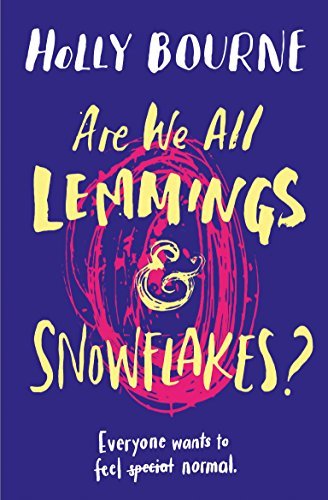
Rating: ★★★★★
Are We All Lemmings & Snowflakes is one of the realest representations of mental illness I've ever read.
Camp Reset is a teen residential camp for mental wellness, and Olive gets invited to spend a month there as part of a trial.
There’s group therapy, and meditation, and CBT (Cognitive Behavioural Therapy), and a chance to socialise with other teens who have mental health difficulties. Olive’s doctors believe she has a mental illness, though she won’t let them tell her what it is.
It took me some time to get into Are We All Lemmings & Snowflakes for some reason… possibly because I was having a hard time getting on with Olive at first. But the more I read, the more I saw a friend from my teens who had a very similar mental illness which I didn't understand at the time. I wish I had read this then, because it's like climbing inside their head.
The characters all feel as if they’re real people, which I love; watching them progress over the course of the novel as they each work through their barriers and learn how to cope with the things that hold them back.
I especially loved the way Holly Bourne managed to work in a lot of good advice for people struggling with mental illness; in this context, you kind of absorb it without feeling like you're being preached at.
Like Wonder, the overarching theme of Lemmings is kindness (although this is definitely a book for teens, where Wonder was suitable for younger readers).
“Yes, I know, we're not going to cure the world with just kindness, but it can at least help. Think about it. Think of every single horrid moment of your life. Now imagine how different things would've been if someone there, in that moment, had been kind to you. Like they didn’t laugh when you fell over, or interrupt you when it took you too long to get a sentence out, or push a spliff into your face and make it clear it was what you needed to do to fit in.”
This is really powerful. The book explores the importance of being kind to others, and the impact that could have on everyone’s mental health. Olive is ecstatic: with the help of her newfound friends, she’s discovered the cure to all the world’s problems! But she’s forgetting something.
Herself.
Because yes, the novel argues, we do need to be kind, but not at the expense of ourselves. In fact, we should be kind to ourselves first.
“I’m saying you should attach your own oxygen mask before helping people with theirs, Olive.”
I love the book’s message, its themes, its writing, and its story - I found myself getting hooked, holding my breath as Olive's manic episode got more and more prolonged. I found the ending’s call-backs to the beginning very interesting.
I only wish that the story could continue! I really want to know what happens with all the others, how things play out between Olive and Lewis, how Olive’s friends coped with their big mission… but the book does end in an appropriate way and place, and even included a short letter at the end from Holly Bourne (no spoilers).
“I’m hoping this book will help people realise that your misbehaving brain is actually a totally appropriate response to the life you’ve had up until now. And we don’t have to put up with it. If we fight back, if we campaign, if we don’t accept the way things are, I really believe we can create a world that’s kinder. One that doesn’t make people ill. But kindness starts from within. You have to be kind to yourself first. So, please, if you take anything from this book, may it be the lesson to be less hard on yourself.”
Content warnings: bullying, anxiety, panic attacks
Age-appropriate?: sexual content, strong language
0 notes
Text
Thirteen Reasons Why by Jay Asher

Rating: ★★☆☆☆
I didn’t read this until after its peak popularity. It’s also a Netflix series, with its final season releasing in June. It’s hard to pinpoint exactly how I feel about this one.
This book (and review) discusses suicide.
Thirteen Reasons Why’s protagonist, Clay Jensen, finds a box of cassette tapes on his doorstep. The tapes are made by Hannah, his crush from school, who recently took her own life. The tapes explain the 13 reasons why she did it, with instructions to pass them on to the next person mentioned in the tapes - all of whom she accuses of doing something, or not doing something, which led to her suicide.
I thought the narration style was interesting - the way Hannah’s recording is overlaid with the present, woven directly between Clay’s thoughts and actions, rather than being, say, separate chapters. We get to see his immediate reactions to everything she says, and are provided with context as Clay remembers the events Hannah recounts. This gives an immediacy to the recordings, and the author takes the reader on a journey to all the places mentioned in the tapes, by having Clay travel around the neighbourhood while listening to them.
With 13RW, it seems Jay Asher’s intent is to inspire the reader to think about the effects that actions (and inaction) can have on others; every comment or laugh or note passed, every failure to notice something or acknowledge someone, can have a lasting impact. This is really important - especially for teenagers at school, where it can be hard to avoid getting roped into gossip, teasing, or even bullying.
“No one knows for certain how much impact they have on the lives of other people. Oftentimes, we have no clue. Yet we push it just the same.”
However, I don’t like the premise of the book. The way Hannah manages to ‘speak from beyond the grave’ to all the people who were mean to her - even acknowledging that she’ll be dead when the tapes get listened to - appears to romanticise her suicide and give it a ‘purpose’ (i.e. teaching everyone a valuable lesson). It also implies that everyone she knew was responsible in some way for her choosing to take her own life, which I feel might be a bit hurtful for readers who’ve lost someone to suicide in real life.
While the circumstances following Hannah’s suicide and her message from beyond the grave might not be all that realistic, it certainly led to discussions on the topic. If this story of a fictional suicide causes people to think more about what effect their words and actions have on others, and realise that it’s not always obvious when a someone might be considering suicide, so much the better.
If you’re affected by suicidal thoughts, or you think someone you know might be, Rethink Mental Illness has helpful information, as well as a list of useful contacts for finding support: https://bit.ly/RethinkSupport
Content warnings: suicide, drinking, rape
Age-appropriate?: sexual content + above content warnings
0 notes
Text
Everything, Everything by Nicola Yoon

Rating: ★★★★★
I devoured this book in less than 24 hours. You hear “unputdownable” tossed around a lot these days but I honestly barely stopped to do anything else.
Maddy suffers from severe combined immunodeficiency (SCID), and hasn’t left her house since she was a baby. She can’t be exposed to the outside world, because the slightest thing could trigger a deadly reaction. She’s mostly okay with it - she has her books, and her mom, and her nurse Carla.
Until Olly moves in next door, a boy the same age, full of life and energy (and very attractive). Olly reaches out to Maddy and they begin chatting over IM every day, and before long, she manages to convince Carla to allow Olly a visit. Just once. Or twice. Or... maybe a bit more than twice. What could go wrong?
Turns out falling in love when you’re never going to leave your house leads to a lot of heartache.
“I look around my white room at my white couch and shelves, my white walls, all of it safe and familiar and unchanging.
I think of Olly, decontamination-cold and waiting for me. He’s the opposite of all these things. He’s not safe. He’s not familiar. He’s in constant motion.
He’s the biggest risk I’ve ever taken.”
Everything, Everything gripped me by my emotions and did not let go. It’s one of those books that once you finish it, you can’t start anything else for a few days because you’re still so absorbed by it.
Because I criticised The Art of Being Normal for two underage kids having a shockingly easy time booking a B&B room and getting extremely drunk in a pub, I do feel the need to mention that Maddy, a teenager with no real world experience, seemed to have absolutely no trouble getting a credit card, booking a hotel, and getting on a flight to Hawaii completely unhindered, all without her very watchful mother knowing, to boot. Hmm. Very convenient.
I do like the interspersed lists and drawings and Maddy’s ‘Life Is Short™ Spoiler Reviews’ which demonstrate certain aspects and messages and tell you about things that happen without actually telling you.
“The Little Prince by Antoine de Saint-Exupéry
Spoiler alert: Love is worth everything. Everything.”
Also, it’s probably a small thing, but the instant messaging conversations between Olly and Maddy feel so real. Even in YA novels, you sometimes come across characters who SMS or email (?!) each other with CUL8Rs and ROFLMAOs in all-caps and it’s a bit cringe. (If the book was written before 2011 I can forgive it. Otherwise, come on, that sort of text speak died with flip phones.) Nicola Yoon really hit the nail on the head though with conversations that feel more natural and appropriate to the characters.
“Madeline: What colour are your eyes? Olly: blue Madeline: Be more specific please Olly: jesus. girls. ocean blue Madeline: Atlantic or Pacific Olly: atlantic. What colour are yours? Madeline: Chocolate brown. Olly: More specific please Madeline: 75% cacao butter, dark chocolate brown Olly: hehe. nice”
The twist completely changed the tone for me and made it a story about something different, but equally as important. Though the main questions of the book remain, for me, the same: what is worth risking for love? Everything?
And would you sacrifice the rest of your life in order to live?
Content warnings: domestic/emotional abuse
Age-appropriate?: sexual content, strong language
0 notes
Text
Ink and Bone by Rachel Caine
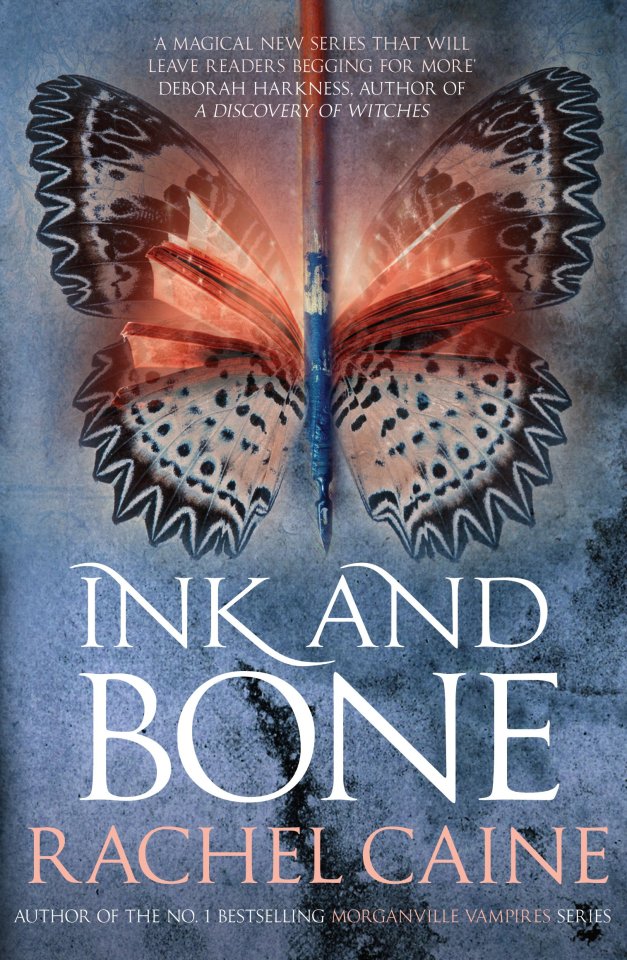
Rating: ★★★★★
What if the Library of Alexandria never burned down? What if it went on to become the most powerful institution in the world? What if this power allowed it to control all knowledge, burying the things that might threaten it, and promoting the ideals of its unscrupulous leader - like the belief that knowledge is far more important than human lives?
One of my all-time favourites!
In a world where all knowledge is controlled via codexes that must be programmed and distributed by the Great Library, there’s an underground black market for actual, original books. Jess Brightwell is a runner for his father, a big part of the black market, and is sent to train to become a Scholar at the Great Library in Alexandria, as a spy.
Becoming a Scholar is no walk in the park.
“’The first purpose of a librarian is to preserve and defend our books. Sometimes, that means dying for them - or making someone else die for them.’”
And there is death - some students don’t even make it to the end of the training. But there is also a little romance. A touch of intrigue. A dangerous dark secret or two. There’s also people with alchemical powers, giant automata roaming the streets, teachers with mysterious backgrounds… what’s not to love?!
Seriously, this is one of my favourite series of all time; it gets even better the further in you get. Stakes get higher, tension gets tauter, your heart gets broken and mended and broken again. The characters are so realistic and well-rounded they feel like old friends. The worldbuilding is realistic and richly detailed - I love the historical letters and journal entries scattered throughout the book, giving little clues, revealing just enough. It’s fast paced, too - the plot never feels boring. I was constantly on tenterhooks waiting to see how they could possibly survive, let alone succeed. And speaking of tenterhooks, every book ends on a cliffhanger so finishing each book and knowing I’d have to wait a year to find out what happens almost killed me! It was so worth it though.
Also, Rachel Caine deserves an award for introducing a character that I absolutely detested at first who then went on to become my favourite character in the series.
Despite the Great Library being corrupt in this universe, Ink and Bone and its sequels are still a love letter to books and libraries. As someone who loves both, it really spoke to me. In the second book, Jess ruminates on how the Library, at its heart, is really a force for good.
“Books had become a symbol of trust and libraries places of peace and stability. In all the chaos of the world that counted people as different levels of worthy, the Library served all equally. All genders, races, levels of ability. It was the one place they could all be safe.”
Content warnings: mentions of grooming
Age-appropriate?: violence, later books contain torture
0 notes
Text
The Art of Being Normal by Lisa Williamson
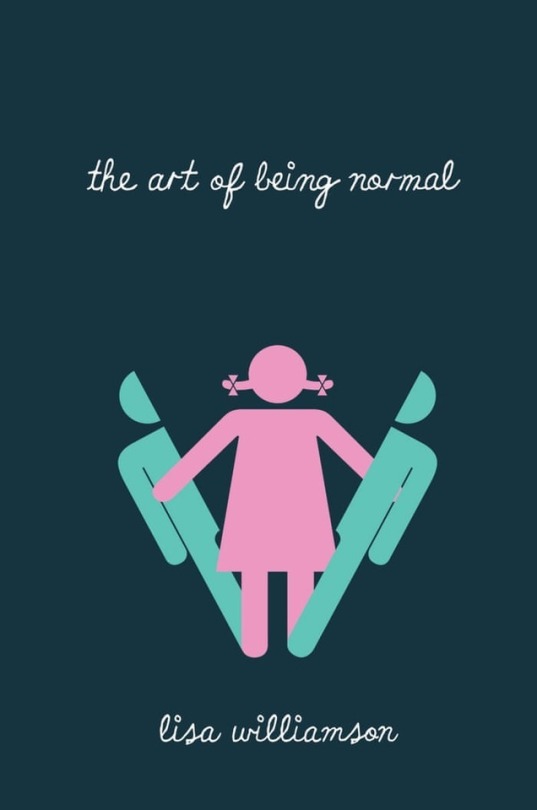
Rating: ★★★☆☆
“I’ve spent my whole life being told I’m the complete opposite of ‘normal’.”
The Art of Being Normal is about two transgender teenagers, Leo and David, both misfits who end up becoming friends. As a story, I mostly enjoyed this - even though some parts felt unrealistic.
For example, a 14 and 15 year old being allowed to rent a room on their own with no questions asked? A 14 and 15 year old not being asked for proof of age in a pub? Hmmm.
On the other hand, there are some really emotional and touching moments, and it kept me hooked wanting to find out where it would lead. And I liked the progression that the characters made, especially David.
However, this book has been criticised by transgender readers for not handling or portraying the experience of being trans well, which is a valid complaint. Obviously I don’t really feel qualified to comment on that aspect, though Leo did do some questionable things, like not ask David about pronouns or anything when he found out, which felt a bit... weird.
The book does have a few heartwarming and satisfying aspects, though. If you’re looking for good LGBT+ books, this is not bad, but maybe not the best option for accurate representation. If you like this, though, I’d recommend Lies We Tell Ourselves by Robin Talley. (And even if you didn’t like this, I still recommend it.)
Content warnings: attempted rape, bullying, transphobia
Age-appropriate?: underage drinking, sexual content
0 notes
Text
Wonder by R. J. Palacio

Rating: ★★★★★
Wonder is a novel about acceptance, prejudice and kindness, and it hardly needs an introduction at this point. It's received numerous awards, been translated into 29 languages and was adapted into a film in 2017. Nonetheless, Wonder is still worth talking about.
August Pullman was born with a facial abnormality and spent most of his childhood hiding inside an astronaut helmet so that people won't stare at him; now, at 10, he's starting school for the first time.
R. J. Palacio wrote Wonder after an incident where her 3 year old son noticed a girl with a severe facial difference and started to cry.
Although the book is about ten year olds, I would still recommend this to teens. To anyone actually! This book forces you to question the assumptions we make about people. It asks you what words like 'ugly' mean, and why or whether it matters.
Being narrated in first person mostly by Auggie himself, Wonder is fantastically frank and honest. Auggie is not afraid to talk and joke about his face.
"Yeah, it's no big deal," he said casually. "The main thing I have is this thing called man-di-bu-lo-facial dys-os-tosis--which took me forever to learn how to pronounce, by the way. [...] I don't want to brag or anything, but I'm actually considered something of a medical wonder, you know." He smiled." That was a joke," he said. "You can laugh."
Some people are unkind to Auggie at first. But it's these people who Auggie has the greatest effect on, and it's intriguing to follow their journey over the course of the novel as they learn to accept him.
Wonder is one of those books I can't fault. It's engaging (I read it in more or less one sitting), striking in its honesty, and compelling in the way it addresses its themes. Auggie Pullman captured the hearts of people all over the world, inspiring the Choose Kind movement, which encourages young people to go out of their way to be more kind than is necessary.
Wonder is available just about everywhere you can find books, and I encourage everyone to read it. I'll certainly never forget it myself.
“Courage. Kindness. Friendship. Character. These are the qualities that define us as human beings, and propel us, on occasion, to greatness.”
Content warnings: bullying, death of a pet
Age-appropriate?: no warnings
0 notes
Text
Noughts and Crosses by Malorie Blackman
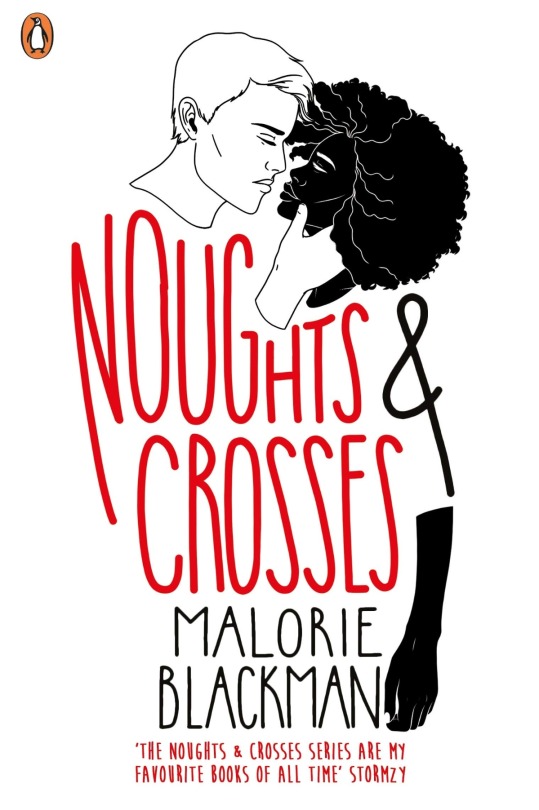
Rating: ★★★☆☆
Damn. Damn.
Beware: this review will have to contain spoilers about halfway in because I can't talk about Noughts and Crosses without talking about that ending and what it did to me.
So it took me a while to get into this; I might even say I didn't truly get into it until over halfway through. But after a certain point I got very emotionally invested.
Noughts and Crosses tells the story of Sephy and Callum. Sephy is black, a Cross. Callum is white, a Nought - Noughts were once the slaves of Crosses, and are only just beginning attempts to integrate into society. Callum is one of the first Noughts to ever be accepted into a Cross school - and it's his best friend Sephy's school to boot. What could go wrong?
Everything, apparently.
Noughts and Crosses punched me in the gut several times. Every time I thought things couldn't possibly get any worse - or when I thought things might finally start looking up for the main characters - the book proved me wrong. But because this is a series, **SPOILER WARNING** I assumed I was safe in my belief that both of them would at least survive until the end of this book. The rest of the series is probably going to be about these two. Right? Malorie Blackman wouldn't actually hang Callum and leave Sephy pregnant with his unborn child, ostracised by her family, and presumably in danger.
Right?
But perhaps it was Malorie Blackman's intention to make us suffer. She certainly makes you think, at least.
My only gripe with Noughts and Crosses (other than tearing my heart out) is that the writing style is not what I'd normally go for. Perhaps it appeals to some people, but it's not for me - it felt a bit childish at times?
Jeez! Time moved like a petrified glacier.
Mrs Paxton was blathering on about simultaneous equations like they were the best thing since computers were invented. And every word was flying zip-zap straight over my head! When was the bell going to sound? Come on... Come on... At last!
And there are parts where sentence structure kind of leaves something to be desired...
It was time for History. I hate History. It's a total waste of time. There was only one good thing about it. Callum was down to take History as well. My friend Claire tried to sit down next to me. [...] Claire gave me a scathing look. 'Be like that then.' And she flounced off without a backwards glance. I sighed and watched the door eagerly. Callum and the other Noughts were the last ones to come in.
I respect you Ms Blackman, but have you heard of conjunctions?
That said, in a way my aversion to the writing style just makes it even more impressive that Malorie Blackman managed to get me so invested. She still conveys emotions with skill, the pacing felt appropriate, and the novel gains gravitas as it progresses.
I'm not planning to read the rest of the series at the moment, but I'm not going to rule it out. If you like this, you will probably also enjoy Lies We Tell Ourselves by Robin Talley!
Content warnings: alcoholism, racism, violence, capital punishment, suicide
Age-appropriate?: occasional strong language, non-graphic sexual content
0 notes
Text
Guest Review: Nichijou by Keiichi Arawi

This review is written by my fellow library assistant Amelia! I can confirm that Nichijou is an absolute joy to read and fully recommend it.

Perfect for reading during lockdown.
0 notes
Text
Miss Peregrine’s Home for Peculiar Children by Ransom Riggs

Rating: ★★★★☆
If you like creepy vintage photos, time travel shenanigans, and/or eerie paranormal mystery, this is the book for you.
Peculiar Children begins with the peculiar death of Jacob’s peculiar grandfather. The mysterious circumstances cause Jacob to believe that his strange tales might not be fairytales after all, and his grandfather’s dying words lead him to an abandoned children’s home on a remote island in Wales, seeking answers. But the abandoned children’s home is not quite as abandoned as it seemed... the strange supernatural children who lived there in the 1940s are somehow still alive.
And this is only the beginning.
This book is unique as it combines fiction with photography, which is something I’d never come across before. Strange vintage photographs (with minimal editing, according to the author!) are spread throughout the book to illustrate the story, and this is what attracted me to this book in the first place. That’s not to say that the novel wouldn’t hold up well on its own, of course. But it has the unfortunate side effect that some things seem to have been shoe-horned into the narrative for the sake of including a particular photo; like the defaced picture of the bus driver, whose existence doesn’t make any impact on the plot whatsoever.
The book makes for interesting reading, regardless, and has some pretty original-feeling worldbuilding. I do recommend it (and the rest of the series, though I’m only up to book 4). You’ll probably like Peculiar Children if you liked Derek Landy’s Skulduggery Pleasant, though this series is aimed at an older audience than Skulduggery.
Oh, and don’t ask me about the Peculiar Children movie. We don’t talk about that.
Content warnings: violence, mild body-horror
Age-appropriate?: no warnings
0 notes